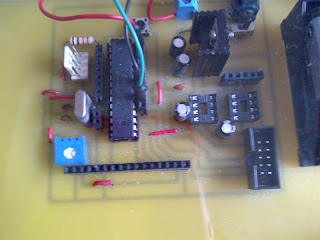Finally, the day had come! Alhamdulilah I managed to finish my final year project.! First and foremost, I would like to express my heartily gratitude to my supervisor, Madam Siti Afifah binti Mohshim for the guidance and enthusiasm given throughout the progress of this project. My appreciation also goes to my family who has been so tolerant and supports me all these years. Thanks for their encouragement, love and emotional supports that they had given to me. In preparing this report, I was in contact with many people, researches, academicians and practitioners. They have contributed towards my understanding and thoughts.
Sunday, November 18, 2012
Industry Day.
Assalamualaikum w.b.t.
Finally, the day had come! Alhamdulilah I managed to finish my final year project.! First and foremost, I would like to express my heartily gratitude to my supervisor, Madam Siti Afifah binti Mohshim for the guidance and enthusiasm given throughout the progress of this project. My appreciation also goes to my family who has been so tolerant and supports me all these years. Thanks for their encouragement, love and emotional supports that they had given to me. In preparing this report, I was in contact with many people, researches, academicians and practitioners. They have contributed towards my understanding and thoughts.
Finally, the day had come! Alhamdulilah I managed to finish my final year project.! First and foremost, I would like to express my heartily gratitude to my supervisor, Madam Siti Afifah binti Mohshim for the guidance and enthusiasm given throughout the progress of this project. My appreciation also goes to my family who has been so tolerant and supports me all these years. Thanks for their encouragement, love and emotional supports that they had given to me. In preparing this report, I was in contact with many people, researches, academicians and practitioners. They have contributed towards my understanding and thoughts.
Final Touch Up
Assalamualaikum w.b.t
its 2 days more before the industry day. so for today I have to complete all the frameworks. because of fully concentration I forgot to snap all the steps. after finished the projects then i realized that i did not snap any single pictures! huuu.. i'm so careless.. my bad.
its 2 days more before the industry day. so for today I have to complete all the frameworks. because of fully concentration I forgot to snap all the steps. after finished the projects then i realized that i did not snap any single pictures! huuu.. i'm so careless.. my bad.
the final touch up.
Result
Assalamualaikum w.b.t
Besides
the programming, this study also examines how the ultrasonic sensors functions.
All the data are gathered presented in Table 3. The table shows analysis of the
ultrasonic Sensor analog voltage value between the calculation value and
measurement value. Figure 24 illustrate the concepts of the calculation which
is followed with the formulas.
Table
3: Result of analyzing the ultrasonic sensor
|
No
|
Range
(cm)
|
Calculation
(mV) 1 inch= 10mV
|
Measured
(mV)
|
Error
%
|
|
1
|
0
|
0
|
0
|
0
|
|
2
|
5
|
50
|
42
|
16
|
|
3
|
10
|
100
|
94
|
6
|
|
4
|
15
|
150
|
142
|
5.3
|
|
5
|
20
|
200
|
193
|
3.5
|
|
6
|
25
|
250
|
245
|
2.0
|
|
7
|
30
|
300
|
296
|
1.3
|
|
8
|
35
|
350
|
346
|
1.1
|
|
9
|
40
|
400
|
396
|
1.0
|
Figure 24: Square Wave Oscillation
Figure
24 shows the usual square wave. In each time interval, the waves repeat
regularly because they are stable. The waves commute between V- and V+, stop at
every stage of running time (Ta or Tb). Therefore, t is the addition of Ta and
Tb.
T
= Ta + Tb
Where
T is the period of the square wave
Ta is the interval between T1 and T2
Tb is the interval between T2 and T3
For frequencies,
T = (1/F) = 0.69 C1 [2R1 + (R2+R3)]
By using the formula above, duty
cycle can be found through the calculation steps as follows:
T off = 0.69C1
T on = 0.69C1 (R1 +R2+R3)
Duty cycle = (T on / T)
Duty cycle = (R1+R2+R3) / [(R2+R3) +2R1]
In
Table 3, the voltage values obtained from the test are slightly different from
the values shown in the ultrasonic sensor data sheet. It shows that there were
errors with the ultrasonic analog output by. In relation, Figure 25 shows the
difference between calculation value and the measured value.
Design Process
Assalamualaikum w.b.t
After confirm the circuit, next step are design process. The design process is based on the architecture. Basically the ultrasonic path planning functions like ordinary blind canes. The difference is that the Ultrasonic path planning is equipped with ultrasonic sensor and circuit box can be placed.
After confirm the circuit, next step are design process. The design process is based on the architecture. Basically the ultrasonic path planning functions like ordinary blind canes. The difference is that the Ultrasonic path planning is equipped with ultrasonic sensor and circuit box can be placed.
There
are a few circuits designed. Firstly the design was tested on the diptrace is
finalized, printed circuit board (PCB) was fabricated. The important element
when designing the PCB is the size of the PCB which is long rather than wide.
It is also to make sure that the design of ultrasonic path planning is small as
possible.
Arduino Uno on PCB with AD622 and 7660s. (top view)
Bottom view
Subscribe to:
Comments (Atom)











